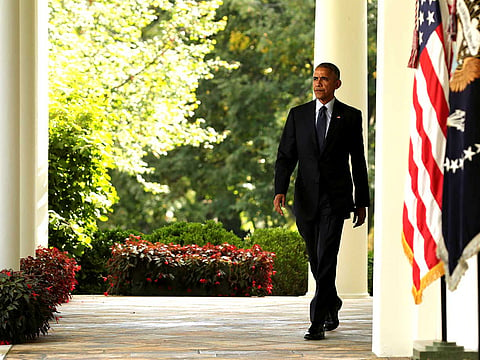Why Obama rewards those who hold him in low regard
Outgoing US president wanted the MOU with Israel to be part of his legacy, and proof that his disagreements with Netanyahu did not imply strategic divergence of interests between the two allies

The United States and Israel have reached an agreement to pump more aid into Israel over the ten-year period starting from 2019. The deal, which was signed at the US State Department on September 14, states that the US will increase its annual military aid to Israel from its current level of $3.1 billion (Dh11.38 billion) to $3.8 billion — an increase of roughly 27 per cent to the $30 billion agreement which covers the period 2008-2018.
The agreement is the largest-ever US commitment in military aid to any given country, and Israel, according to the Congressional Research Service, “is the largest cumulative recipient of US foreign aid since [the Second] World War.” According to the White House, this memorandum of understanding (MoU) is “the most recent reflection of President Obama’s unshakeable commitment to Israel’s security.”
Most of the funds offered ($33 billion out of $38 billion) will be spent on purchasing US military equipment. The remaining $5 billion (at a rate of $500 million per year) will be allocated to fund Israeli missile defence systems. The MoU will also permit Israel to modernise its air force fleet — including the acquisition of 33 F-35 fighter jets, the first two of which will be delivered this December. According to the MoU, Israel will spend more, as much as $1.2 billion per year, “on the advanced military capabilities that only the United States can provide.”
The MoU indicates that “the acquisition of additional US-produced cap-abilities and technology provide the best means to ensure Israel preserves its Qualitative Military Edge (QME).”
The MoU was the outcome of ten months of difficult negotiations. It came amidst US-Israeli disagreement over a number of issues, such as the nuclear agreement with Iran, which Israel strongly opposed.
The two countries were also at odds concerning the resumption of peace talks between the Palestinians and Israelis, a process that Israeli Prime Minister Benjamin Netanyahu had aborted despite Obama’s vigorous attempts to revive it. Henceforth, the MoU was seen as a clear statement that US-Israel relations are above all differences, something Obama insisted on making clear when he commented on the signing of the MoU that “America’s commitment to Israel’s security is unshakeable.”
It is clear that Obama and his close advisers sought this agreement as much as Israel’s prime minister, despite their political differences and personal animosity.
Obama wanted the MoU to be part of his presidential legacy, and proof that his disagreements with Netanyahu did not imply strategic divergence of interests between the two allies. In other words, a confirmation that relations between the US and Israel remain a cornerstone of US strategy in the Middle East.
Pulling rug from under GOP rivals
In addition, Obama wanted to pull the rug from under the feet of his Republican rivals, who have accused him and his administration of not being sensitive enough towards the security, interests and concerns of Israel and its strategic alliance with the US. He indeed wanted to rally support for Hillary Clinton’s bid for the White House among the pro-Israel lobby.
Netanyahu was also desperate to have this agreement. Although he did not get all he asked for in the MoU, and despite domestic criticisms for making major “concessions” to clinch the deal, Netanyahu decided not wait for the next — and maybe more sympathetic — US administration. Netanyahu wanted to prove that signing an MoU with the Obama administration, which has been highly critical of Israel, confirms that the alliance with the US supersedes casual bilateral differences and that support for Israel in the US is a partisan matter.
Yet with this MoU the Obama administration has in fact set aside the promises Obama himself made when he became president in 2009 — to end the Israeli-Palestinian conflict and facilitate the establishment of an independent Palestinian state.
Obama’s humiliating retreat in the face of Netanyahu’s intransigence was nothing but another blow to a president that could keep very little of his word. The statement that the White House had made on the eve of signing the new MoU further demonstrated how weak this administration is when it comes to Israel: “Under President Obama’s leadership, the multifaceted cooperation between the United States and Israel has reached unprecedented levels.”
Obama’s words that “the only way for Israel to endure and thrive as a Jewish and democratic state is through the realisation of an independent and viable Palestine state,” remained mere words. More misleading was his statement that the aim of the MoU is to contribute to peace in the Middle East by boosting the security of Israel, as if Israel is the victim of “Palestinian hegemony”.
Dr Marwan Kabalan is Syrian academic and writer.


